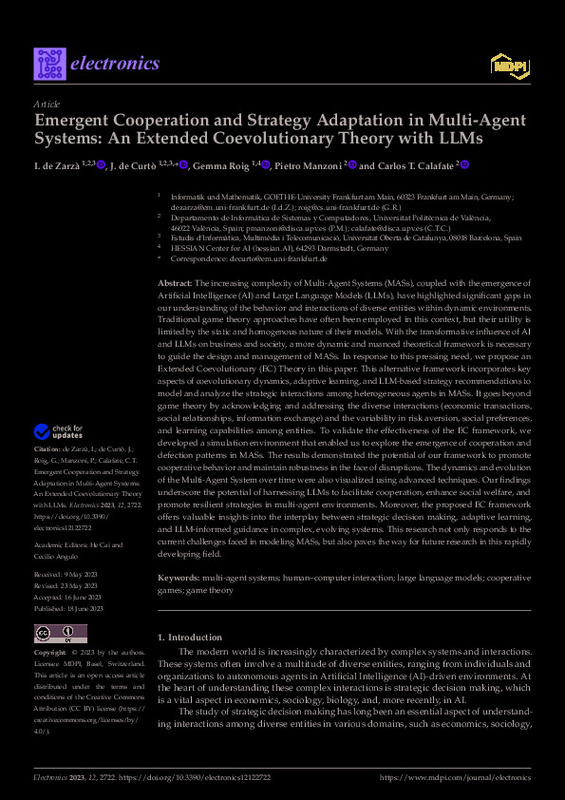JavaScript is disabled for your browser. Some features of this site may not work without it.
Buscar en RiuNet
Listar
Mi cuenta
Estadísticas
Ayuda RiuNet
Admin. UPV
Emergent Cooperation and Strategy Adaptation in Multi-Agent Systems: An Extended Coevolutionary Theory with LLMs
Mostrar el registro completo del ítem
De Zarzà, I.; De Curtò, J.; Roig, G.; Manzoni, P.; Tavares De Araujo Cesariny Calafate, CM. (2023). Emergent Cooperation and Strategy Adaptation in Multi-Agent Systems: An Extended Coevolutionary Theory with LLMs. Electronics. 12(12). https://doi.org/10.3390/electronics12122722
Por favor, use este identificador para citar o enlazar este ítem: http://hdl.handle.net/10251/203880
Ficheros en el ítem
Metadatos del ítem
| Título: | Emergent Cooperation and Strategy Adaptation in Multi-Agent Systems: An Extended Coevolutionary Theory with LLMs | |
| Autor: | de Zarzà, I. de Curtò, J. Roig, Gemma | |
| Entidad UPV: |
|
|
| Fecha difusión: |
|
|
| Resumen: |
[EN] The increasing complexity of Multi-Agent Systems (MASs), coupled with the emergence of Artificial Intelligence (AI) and Large Language Models (LLMs), have highlighted significant gaps in our understanding of the ...[+]
|
|
| Palabras clave: |
|
|
| Derechos de uso: | Reconocimiento (by) | |
| Fuente: |
|
|
| DOI: |
|
|
| Editorial: |
|
|
| Versión del editor: | https://doi.org/10.3390/electronics12122722 | |
| Código del Proyecto: |
|
|
| Agradecimientos: |
We thank the following funding sources from GOETHE-University Frankfurt am Main: DePP-Dezentrale Plannung von Platoons im Straßengüterverkehr mit Hilfe einer KI auf Basis einzelner LKW and Center for Data Science & AI ...[+]
|
|
| Tipo: |
|









